Selected papers will be published in one of the followings:
- Edited book volume
- Academic Journals (as below)
- Conference proceeding
Journals
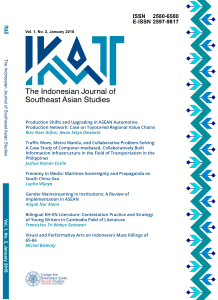 IKAT: The Indonesian Journal of Southeast Asian Studies (indexed by DOAJ and SINTA) IKAT: The Indonesian Journal of Southeast Asian Studies ISSN 2580-6580 (Print) 2597-9817 (Online) is academic, open access, and double blind-reviewed journal about Southeast Asian societies and cultures. Founded in 2017 at the Center for Southeast Asian Social Studies (CESASS) Universitas Gadjah Mada, Yogyakarta, Indonesia. The Journal strives to provide new, rigorous, and comprehensive knowledge and understanding of Southeast Asia through inter-disciplinary perspectives. Its scopes include but are not limited to economic welfare, institutional knowledge production, history, political transformations, and the social development of information and communication technology in the region. Contributors may focus on an in-depth individual country analysis or on comparing a multi-country case study. Given the mission statement of CESASS, contributors are encouraged to submit empirical, methodological, theoretical, or conceptual articles about Southeast Asia through the eye of social sciences. Issues are published biannually (in January and July). Submissions are open year-around and before submitting please ensure that the manuscripts fit within IKAT’s focus and scope, and are written in English and follow our author guidelines.
IKAT: The Indonesian Journal of Southeast Asian Studies (indexed by DOAJ and SINTA) IKAT: The Indonesian Journal of Southeast Asian Studies ISSN 2580-6580 (Print) 2597-9817 (Online) is academic, open access, and double blind-reviewed journal about Southeast Asian societies and cultures. Founded in 2017 at the Center for Southeast Asian Social Studies (CESASS) Universitas Gadjah Mada, Yogyakarta, Indonesia. The Journal strives to provide new, rigorous, and comprehensive knowledge and understanding of Southeast Asia through inter-disciplinary perspectives. Its scopes include but are not limited to economic welfare, institutional knowledge production, history, political transformations, and the social development of information and communication technology in the region. Contributors may focus on an in-depth individual country analysis or on comparing a multi-country case study. Given the mission statement of CESASS, contributors are encouraged to submit empirical, methodological, theoretical, or conceptual articles about Southeast Asia through the eye of social sciences. Issues are published biannually (in January and July). Submissions are open year-around and before submitting please ensure that the manuscripts fit within IKAT’s focus and scope, and are written in English and follow our author guidelines.
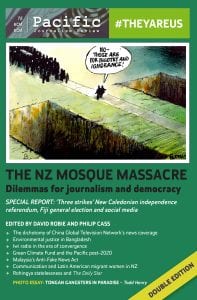
Pacific Journalism Review (PJR) (indexed by SCOPUS; Web of Science; Scimago: Q3)
While one objective of Pacific Journalism Review is research into Pacific journalism theory and practice, the journal has also expanded its interest into new areas of research and inquiry that reflect the broader impact of contemporary media practice and education. A particular focus is on the cultural politics of the media, including the following issues: new media and social movements, indigenous cultures in the age of globalization, the politics of tourism and development, the role of the media and the formation of national identity and the cultural influence of New Zealand as a branch of the global economy within the Pacific region. It also has a special interest in climate change, environmental and development studies in the media and communication, and vernacular media in the region. For more information about PJR and contributors: http://www.pjreview.info/about. Journal articles will be published twice a year collectively, as part of an issue with its own Table of Contents. This journal provides immediate open access to its content on the principle that making research freely available to the public supports a greater global exchange of knowledge. Pacific Journalism Review has a double-blind peer-review process. Two reviewers with expertise in the research field(s) related to submitted papers are usually selected, with the reviewers frequently drawn from the Editorial Board members as appropriate. In the case of major differences between reviewers, a third blind peer reviewer is sought. The current edition editors manage the revisions process.
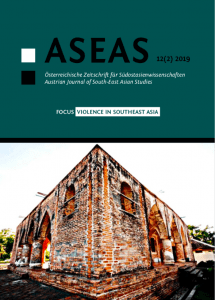
The Austrian Journal of South-East Asian Studies (ASEAS) (indexed by SCOPUS; Scimago: Q2)
The Austrian Journal of South-East Asian Studies (ASEAS) is an international, interdisciplinary, and open access social sciences journal covering a variety of topics (culture, economics, geography, politics, society) from both historical and contemporary perspectives. Topics should be related to Southeast Asia, but are not restricted to the geographical region, when spatial and political borders of Southeast Asia are crossed or transcended, e.g., in the case of linguistics, diaspora groups or forms of socio-cultural transfer. ASEAS publishes two focus issues per year and we welcome out-of-focus submissions at any time. The journal invites both established as well as young scholars to present research results and theoretical and methodical discussions, to report about on-going research projects or field studies, to publish conference reports, to conduct interviews with experts in the field, and to review relevant books. Articles can be submitted in German or English. ASEAS offers 5 different Sections or Categories: 1) Current Research on Southeast Asia refers to scholarly articles; 2)Research Workshop offers space for reports about ongoing research projects or field studies; 3) In Dialogue refers to interviews with experts on Southeast Asia (academics, politicians, NGO-workers, activists, economic actors, etc.); 4) Network Southeast Asia Research aims at reviewing and reporting on conferences or workshops, and 5) Book Reviews shall give an overview on latest publications (last two years) of international Southeast Asian research.
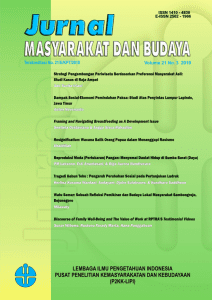 Jurnal Masyarakat dan Budaya (JMB)(indexed by DOAJ and SINTA)
Jurnal Masyarakat dan Budaya (JMB)(indexed by DOAJ and SINTA)
Jurnal Masyarakat dan Budaya (JMB) or Journal of Society and Culture is a peer-reviewed journal that aims to be an authoritative academic source on the study of society and culture. We publish original research papers, review articles, case studies, and book reviews focusing on Indonesian society, cultural phenomena, and other related topics. A manuscript describing society and culture outside Indonesia is expected to be analyzed comparatively with the issues and context in Indonesia. All papers will be reviewed rigorously at least by two referees. JMB is published three times a year, in April, August , and December. Scope of the journal:
Society: Social interaction and transformation; social dynamics in cities, villages, and border areas; the influence of religion and belief in society; and norms, values, and legal system in society. Culture: belief system, language, history, art, ethnicity, and philosophy.
Conference Proceeding SOSS 2020 Symposium of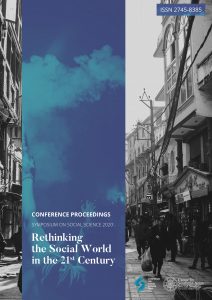 Social Sciences is a biannual international conference arranged by Center for Southeast Asian Social Studies, Universitas Gadjah Mada. This year’s symposium was held under the theme of “Rethinking the Social World in the 21st Century.” The conference’s proceedings book is consisting wide range of topics under the field of social sciences, most notably during the context of disruption caused by the COVID-19 pandemic. Some of the topics are divided broadly into two streams, which are Dimensional Issues in Social Science and specific issues in various branches of the social sciences, such as but not limited to: Law, Technology, and Society; Women and Human Rights Issues; Religion and Multiculturalism; Communication and Media in the Digital Era; and Film and Social Change.
Social Sciences is a biannual international conference arranged by Center for Southeast Asian Social Studies, Universitas Gadjah Mada. This year’s symposium was held under the theme of “Rethinking the Social World in the 21st Century.” The conference’s proceedings book is consisting wide range of topics under the field of social sciences, most notably during the context of disruption caused by the COVID-19 pandemic. Some of the topics are divided broadly into two streams, which are Dimensional Issues in Social Science and specific issues in various branches of the social sciences, such as but not limited to: Law, Technology, and Society; Women and Human Rights Issues; Religion and Multiculturalism; Communication and Media in the Digital Era; and Film and Social Change.
